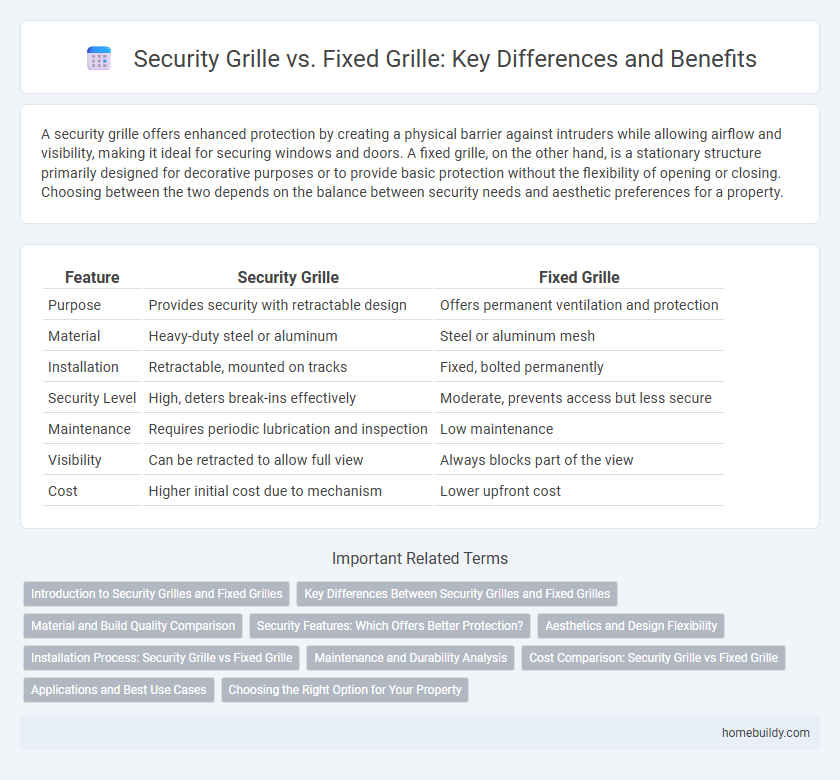A security grille offers enhanced protection by creating a physical barrier against intruders while allowing airflow and visibility, making it ideal for securing windows and doors. A fixed grille, on the other hand, is a stationary structure primarily designed for decorative purposes or to provide basic protection without the flexibility of opening or closing. Choosing between the two depends on the balance between security needs and aesthetic preferences for a property.
Table of Comparison
| Feature | Security Grille | Fixed Grille |
|---|---|---|
| Purpose | Provides security with retractable design | Offers permanent ventilation and protection |
| Material | Heavy-duty steel or aluminum | Steel or aluminum mesh |
| Installation | Retractable, mounted on tracks | Fixed, bolted permanently |
| Security Level | High, deters break-ins effectively | Moderate, prevents access but less secure |
| Maintenance | Requires periodic lubrication and inspection | Low maintenance |
| Visibility | Can be retracted to allow full view | Always blocks part of the view |
| Cost | Higher initial cost due to mechanism | Lower upfront cost |
Introduction to Security Grilles and Fixed Grilles
Security grilles are designed to provide robust protection while allowing air flow and visibility, commonly used in commercial and residential security applications. Fixed grilles, in contrast, are permanently installed with no movable parts, offering constant security and ventilation but lacking flexibility for opening or closing. The choice between security grilles and fixed grilles depends on the balance of accessibility, security level, and ventilation requirements.
Key Differences Between Security Grilles and Fixed Grilles
Security grilles feature movable panels that provide flexible access control while fixed grilles are permanently installed without any operable parts, ensuring a constant physical barrier. Security grilles offer enhanced security through retractability, making them ideal for retail storefronts and high-traffic areas, whereas fixed grilles provide a static deterrent often used for ventilation or as a protective screen. The main distinctions lie in their functionality, installation complexity, and adaptability to different security and access requirements.
Material and Build Quality Comparison
Security grilles are typically constructed from heavy-duty materials like stainless steel or wrought iron, ensuring high durability and resistance to forced entry. Fixed grilles often use lighter metals such as aluminum or mild steel, which provide basic security but less robust protection compared to security grilles. The build quality of security grilles emphasizes reinforced joints and tamper-proof fasteners, enhancing overall strength and longevity beyond that of fixed grilles.
Security Features: Which Offers Better Protection?
Security grilles provide superior protection with robust metal bars and locking mechanisms designed to prevent unauthorized entry, whereas fixed grilles primarily serve as a decorative barrier with limited security functionality. The reinforced steel construction and customizable locking options of security grilles enhance resistance against forced break-ins, unlike fixed grilles that lack comprehensive security features. For high-security requirements, security grilles offer a more reliable deterrent against intrusion compared to fixed grilles.
Aesthetics and Design Flexibility
Security grilles offer enhanced design flexibility compared to fixed grilles by allowing retractable or customizable configurations that blend seamlessly with various architectural styles. Their aesthetic appeal is heightened through diverse material finishes, patterns, and colors, providing a modern and stylish barrier without compromising visibility. Fixed grilles tend to have limited design options and often present a more rigid, utilitarian appearance that may not complement contemporary or dynamic decors.
Installation Process: Security Grille vs Fixed Grille
Security grilles offer a flexible installation process, allowing for easy removal and adjustment without compromising security, whereas fixed grilles require a more permanent and labor-intensive installation involving drilling and mounting for stable attachment. The installation of security grilles typically involves detachable brackets or track systems, reducing downtime and facilitating cleaning or emergency access. In contrast, fixed grilles are secured directly to the structure, making their installation more time-consuming and less adaptable to future modifications.
Maintenance and Durability Analysis
Security grilles offer enhanced durability with robust materials designed to resist tampering and harsh weather, reducing the frequency of maintenance compared to fixed grilles. Fixed grilles, often made from lighter materials, may require more frequent inspections and repairs due to vulnerabilities like rust and structural weakening. Choosing security grilles ensures prolonged operational integrity and lower long-term upkeep costs in high-security environments.
Cost Comparison: Security Grille vs Fixed Grille
Security grilles generally have a higher initial cost compared to fixed grilles due to their moving parts and enhanced security features. Fixed grilles, being stationary, require less maintenance and are more affordable upfront but may lack flexibility in access control. Over time, the durability and functionality of security grilles can justify the higher investment through improved protection and operational convenience.
Applications and Best Use Cases
Security grilles are ideal for securing commercial storefronts, warehouses, and high-risk areas where access control and visibility are crucial, offering retractable or fixed barrier options that deter theft without obstructing airflow or light. Fixed grilles provide a permanently installed, robust solution suited for windows and vents requiring consistent protection, often used in residential or low-traffic commercial settings where ventilation and security must coexist. Security grilles excel in environments that demand flexible access and high security, while fixed grilles serve best in applications needing durable, maintenance-free protection with minimal operational interaction.
Choosing the Right Option for Your Property
Security grilles provide enhanced protection with robust metal bars that deter break-ins, making them ideal for high-risk areas requiring maximum security. Fixed grilles offer a permanent solution with a less obstructive design, balancing visibility and safety for properties where aesthetics and ventilation are important. Selecting the right option depends on factors such as the level of security needed, property location, and desired appearance to ensure optimal safety and functionality.
Security grille vs Fixed grille Infographic

 homebuildy.com
homebuildy.com